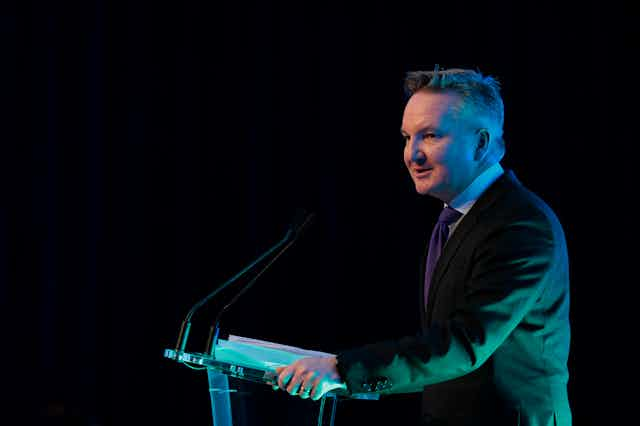The public would be kept up to date on progress towards meeting Australia’s 43% emissions reduction target with an annual ministerial statement and oversight by the Climate Change Authority, under the government’s climate legislation to be introduced on Wednesday.
The government aims to get its signature bill through the House of Representatives in this fortnight’s sitting.
But its fate in the Senate remains uncertain, as the Greens await the outcome of negotiations between their leader Adam Bandt and Climate Change Minister Chris Bowen.
While the government is willing to make minor changes it won’t meet the Greens’ major demands which include no new coal and gas mines.
The legislation enshrines the new target of 43% reduction by 2030, as well as the 2050 target of net zero.
The Climate Change Authority would provide advice on future targets at least every five years, in line with processes under the Paris agreement.
The authority could also be asked for advice on adjusting targets. That advice would be public and the minister would have to take it into account and respond. If the minister disagreed, reasons would have to be tabled.
Any future targets could only increase ambition from current levels, not reduce it.
Bowen said the bill made it clear “that 43% is our minimum commitment – and does not prevent our collective efforts delivering even stronger reductions over the coming decade”.
The legislation would also embed the targets in the objectives of a range of government bodies including the Clean Energy Finance Corporation (CEFC), the Australian Renewable Energy Agency (ARENA) and Infrastructure Australia.
Addressing the first meeting of the Labor caucus, ahead of parliament’s opening on Tuesday, Anthony Albanese said Australia’s updated policy “has meant we have been able to walk through the door of international discussions, not just about climate but about trade and economic relationships, about our social relationships”.
Albanese said the policy change “has made an enormous difference”.
While legislation is not needed to implement the climate policy Bowen said “legislating targets provides the strongest possible signal to industry and investors of Australia’s collective commitment to decarbonising our economy and becoming a renewable energy superpower”.
Governor-General David Hurley delivers an opening speech to the parliament on Tuesday, which will be taken up by ceremony. The speech is written by the government and outlines its agenda.
A plethora of legislation is being introduced this week including on aged care and to repeal of the cashless debt card.
Next Monday will see the introduction of a private member’s bill which would remove the barrier to the ACT and the Northern Territory legislating for voluntary assisted dying. Under 1997 federal legislation the NT and ACT were banned from legislating for this. That federal move quashed the NT’s euthanasia law.
While the bill is sponsored by Luke Gosling from the NT and Alicia Payne from the ACT, the government is according it time so that it eventually comes to a vote. Labor members will have a conscience vote.
Former prime minister Scott Morrison will miss this first week of parliament, in favour of being in Tokyo.
He said in a statement on Monday: “Prior to the new government advising the sitting schedule for the remainder of 2022, I had already accepted an invitation to join other former prime ministers from Canada, the UK and New Zealand to address an international event to be held in Tokyo this week.
"As a consequence I will be unable to attend the first three sitting days of the new parliament this week.”
He will deliver a speech about the Quad. As well, “I will be holding a series of meetings with Japanese political and business leaders and will have the opportunity to join other former leaders to express my condolences for the passing of Prime Minister Abe following his assassination”.

